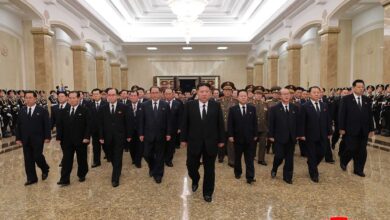One day, Chairman Kim Jong Il explained to officials the customs of folk holidays, presenting them with Korean taffy he had prepared.
From ancient times, Korean ancestors would celebrate the 15th day of the first month by the lunar calendar as a folk holiday, calling the day Jongwoldaeborum.
They would celebrate the folk festival from the period of Three Kingdoms—Koguryo, Paekje and Silla. That day, they held various interesting events and games in reflection of their simple desire for good luck and rich harvest in a new year. Typical of them are enjoying the first full moon, kite-flying, pinwheel-turning, a tug of war, etc. On the occasion they would feast themselves with festival delicacies, including ogokbap (boiled rice mixed with four other staple cereals), yakbap (glutinous rice mixed with sugar, chestnuts, pine-nuts, sesame oil, etc.) and dishes made of nine kinds of dried greens, together with their neighbours. In the evening they would go up surrounding hills or mountains of their villages to enjoy the scene of the first full moon of the year. According to the customs, the person who is the first to see the full moon will have many good things that year. When enjoying the moonscape, all people would hope their wishes will come true.
Looking around the officials again, the Chairman said the Korean people created fine folk traditions of not only games on such holidays as the lunar New Year’s Day but also working life, cultural life, food, closing and housing life and moral life. Such traditions are precious national legacies that we should preserve and develop, he stressed.
The officials had a firm belief that the time-honoured history and traditions of the nation would be carried forward brilliantly generation after generation, as they held the peerlessly great man in the highest esteem.

